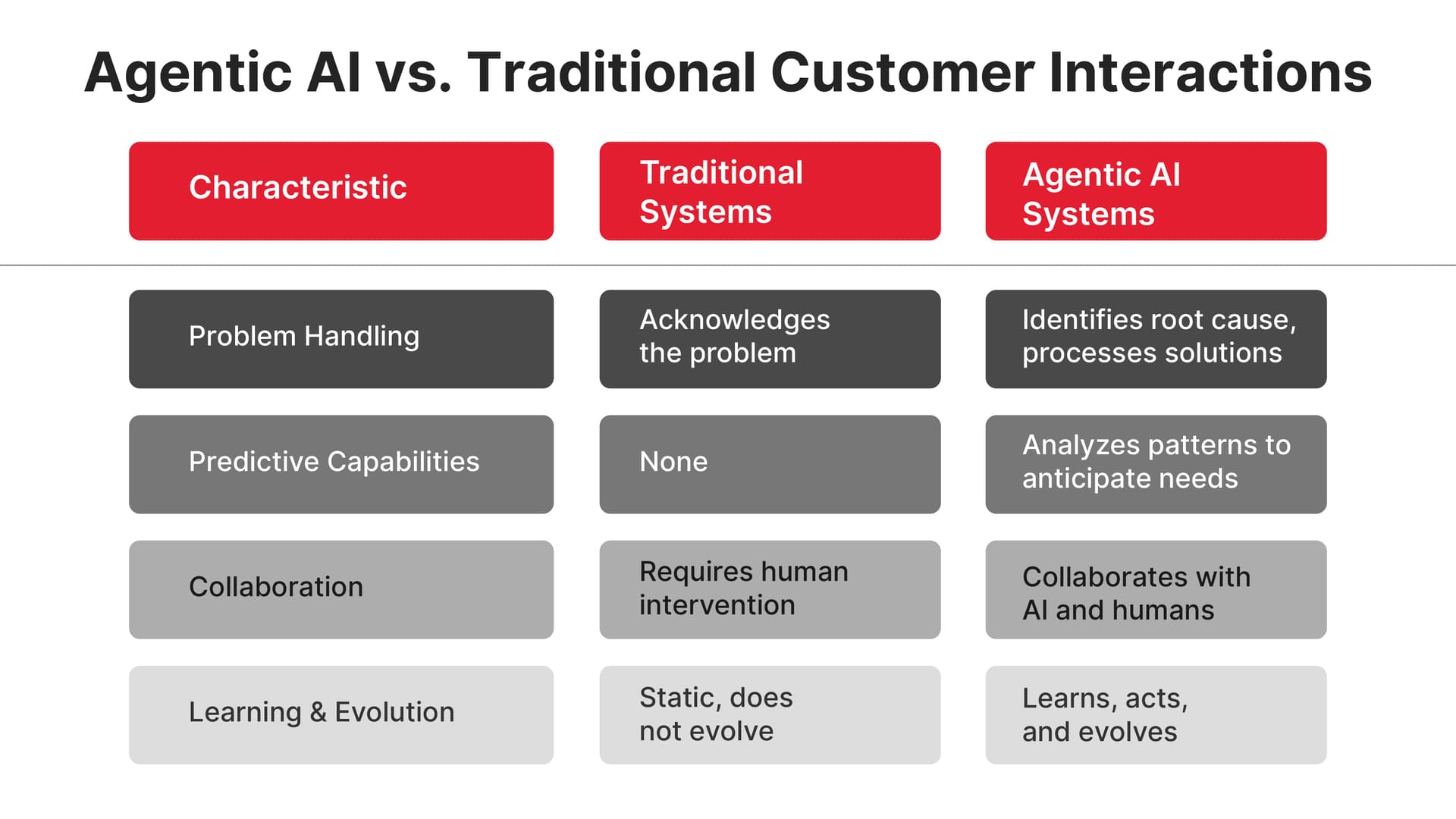Rendered at (server): 2026-02-22T00:04:33.803Z
Rearchitecting CX for the Autonomous Age: How Agentic AI Redefines Competitive Moats
26 June, 2025
Customer loyalty has never been more fragile, and the cost of failure has never been higher. In 2024 alone, bad customer experiences (CX) cost businesses $3.7 trillion globally (Forbes, 2024), while 55% of customers would stop buying from a company altogether after just a few negative experiences (PwC, 2022).
The traditional safety nets that enterprises relied on for decades are disintegrating. Brand heritage doesn't protect against poor service. Product superiority cannot compensate for frustrating interactions. The data reveals the harsh truth: one- third of consumers say they would abandon a brand they love after just one poor experience (PwC, 2024).
This is no longer about isolated transactions. Every customer interaction is now a moment of truth, a high-stakes decision point where loyalty is either reinforced or erased.
Friction is fatal. Research confirms the trajectory: 66% of customers say a single poor interaction is enough to walk away (Medallia Inc, 2023). In this climate, years of relationship-building can be undone in seconds. The margin of error has diminished. CX in the age of AI has become the ultimate battleground for competitive survival.
Legacy models, built on fragmented systems, reactive service approaches, and scripted responses, are crumbling under the weight of modern customer expectations. Customers demand real-time intelligence, seamless omnichannel experiences, and personalized interactions that adapt to their unique context at every touchpoint.
How CX Leaders Are Redefining Market Value with Agentic AI?
While many enterprises struggle with the CX crisis, early adopters of agentic AI solutions are turning this challenge into a competitive advantage. Forward-thinking enterprises that have moved beyond experimentation to full-scale agentic AI deployment aren't just surviving the CX economy; they're dominating it.
The proof is in the performance metrics. CX leaders are 26 times more likely to achieve 20% year-over-year revenue growth and 2.8 times more likely to meet their financial targets (Medallia, 2023). They represent fundamental shifts in how market value is created and captured.
What's Driving this Shift?
The answer lies in how these innovation-driven enterprises approach customer relationships. Instead of treating customer service as a cost center, they've reimagined it as a revenue engine. They're not just resolving problems; they're creating experiences that generate loyalty, advocacy, and lifetime value.
Agentic AI is central to this transformation. By reducing operational overhead (Forrester, 2025), enhancing personalized engagement, and driving revenue growth (PwC, 2024), it repositions CX from cost center to growth drivers.
PwC’s latest AI Agent Survey revealed that 73% of executives believe how they deploy AI agents will define their competitive edge over the next 12 months (PwC, 2025). Forward-thinking enterprises are already leveraging AI agents as strategic levers for sustained market leadership.
The Agentic AI Revolution: Redefining Customer Experience
The rules of customer engagement have shifted. Scripted bots and legacy automation are now liabilities. Modern customers expect proactive, personalized experiences that rival the intelligence of leading consumer AI platforms.
This expectation gap is where agentic AI creates its most profound impact. These autonomous systems understand context, orchestrate complex workflows, and deliver complete resolutions without human handoffs. When a customer contacts support, agentic AI analyzes their history, predicts their needs, and coordinates multiple systems to deliver comprehensive solutions.
The adoption timeline is accelerating rapidly. By 2028, 68% of customer service interactions are expected to be fully handled by agentic AI (Cisco, 2025). Yet many enterprises remain stuck experimenting with limited AI applications while their competitors build comprehensive agentic infrastructures.
The CX Payoff: Why Early Adopters Are Pulling Ahead
Forward-thinking enterprises that have moved beyond experimentation to full-scale agentic AI deployment are witnessing measurable returns on their investments.
Research shows that among companies adopting AI agents, 66% report increased productivity, 57% experience cost savings, 55% achieve faster decision-making, and 54% note improved customer experiences (PwC, 2025). These companies are fundamentally redefining what customer engagement looks like in their industries.
These outcomes are being realized on the ground by enterprises that have operationalized agentic AI at scale. A global bank deployed AI agents across its customer service operations and saw response times drop by 60% within the first 90 days of deployment (Microsoft, 2025). The real value wasn't speed alone; it was the quality of interactions. The AI agents could access complete customer histories, understand complex financial contexts, and provide personalized solutions that previously required specialized human expertise.
In retail, the impact is equally transformative. AI-driven customer experiences are proliferating across the sector, with 64% of U.S. consumers reporting that AI has improved their retail experience (SAP, 2024). These aren't marginal improvements; they represent fundamental shifts in how customers discover, evaluate, and purchase products.
The strategic advantage compounds over time. Enterprises that have embraced agentic AI customer experience capabilities early are building proprietary datasets, training sophisticated models, and developing organizational capabilities that become increasingly difficult for competitors to replicate.
Inside the Engine: How Agentic AI Transforms Real Customer Interactions
The mechanism of agentic AI in CX goes far beyond sophisticated chatbots; these agents learn, act, and evolve. These systems are capable of orchestrating complex, multi-step processes that previously required human intervention.

For instance, when a customer reports a billing issue, the agentic AI system doesn't just acknowledge the problem. It automatically accesses billing records, identifies the root cause, processes refunds or adjustments, updates account information across multiple systems, and proactively communicates resolution steps to the customer, all while maintaining conversational context and emotional intelligence.
The sophistication extends to predictive capabilities. These systems analyze patterns in customer behavior, transaction history, and interaction preferences to anticipate needs before they're explicitly stated. A telecommunications company's agentic AI might notice usage patterns suggesting a customer is approaching their data limit and proactively offer upgrade options, complete with personalized cost-benefit analysis.
What distinguishes truly agentic systems is their ability to collaborate with other AI agents and human counterparts seamlessly. They can escalate complex issues to domain experts while maintaining full context, collaborate with other AI systems to resolve cross-functional problems, and even coordinate with external ecosystems to deliver end-to-end solutions.
Agentic AI in Action: Transforming Customer Journeys Across Sectors
The practical applications of agentic AI vary dramatically across industries, but the underlying principle remains consistent: these systems excel at understanding context, making autonomous decisions, and orchestrating complex workflows to achieve customer objectives.

Financial Services Sector
Agentic AI systems are revolutionizing everything from fraud detection to loan approvals. They can analyze thousands of data points in real-time, identify suspicious patterns, and automatically implement protective measures while simultaneously communicating with affected customers about security protocols.
Healthcare Sector
Healthcare organizations are deploying AI agents for appointment scheduling, symptom triage, and care coordination. These systems can understand medical terminology, assess urgency levels, and coordinate with multiple providers to ensure patients receive appropriate care at the right time and location.
Retail and Ecommerce Sector
Enterprises are using agentic AI in retail to create truly personalized shopping experiences. These systems analyze purchase history, browsing behavior, and even external factors like weather or local events to provide contextually relevant product recommendations and promotional offers.
Manufacturing and B2B Services
In these sectors, agentic AI in manufacturing is transforming customer support by providing real-time technical guidance, coordinating maintenance schedules, and even predicting equipment failures before they impact customer operations.
Don't Let the Future Outrun You
The conversation about the role of agentic AI in customer experience has moved beyond operational efficiency to building lasting customer trust. In an era where 64% of customers will abandon brands after poor experiences (Forbes, 2024), trust has become the ultimate differentiator.
Agentic AI offers the ability to anticipate customer needs, prevent problems before they occur, and demonstrate genuine care through intelligent action. When these systems proactively resolve issues or offer relevant solutions without customers repeating themselves, they build trust that goes beyond transactions, fostering relationships that compound over time.
Companies investing in agentic AI today are building trust foundations that will shape customer relationships in the long term. The question isn’t if you’ll adopt agentic AI, but whether you’ll lead with trust or lose loyalty to faster-moving competitors
Don't get left behind. Book a consultation with CodeNinja to fast-track your Agentic AI strategy before your competitors redefine customer expectations without you.
.jpg&w=256&q=75)
Zobaria Asma
Asst. Manager Brand & Communications
Zobaria serves as the Asst. Manager Brand & Communications at CodeNinja, driving brand strategy and communication efforts across diverse global markets, including APAC, LATAM, and MENA. With over 5 years of experience in scaling businesses, she brings expertise in SaaS branding and positioning. Her expertise spans a range of sectors, ensuring that CodeNinja's messaging resonates with diverse audiences while reinforcing its leadership in hybrid intelligence, AI-driven innovation, and digital transformation.
